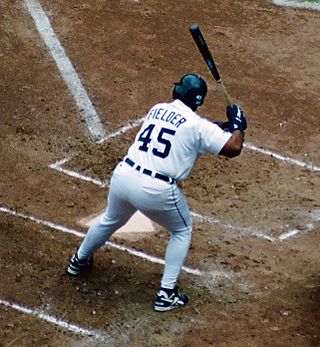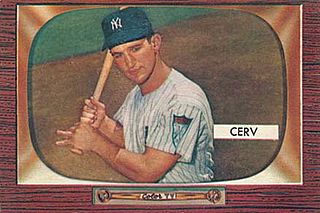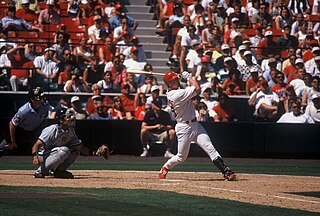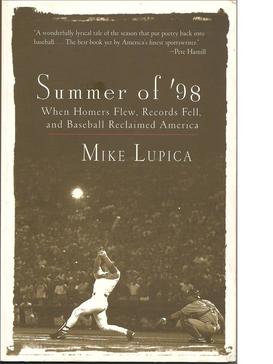
In 1961, the AL expanded from eight to ten teams. In the expansion draft, the newly created Los Angeles Angels and Washington Senators [b] were restricted to drafting players from AL rosters. The perceived result was that American League team rosters had become watered down, as players who would otherwise have been playing at AAA, if not lower, were now in the AL. In order to maintain a balanced schedule, AL owners extended the season from 154 games to 162 games in 1961. (The National League expanded from eight to ten teams and its season to 162 games in 1962.) [23] On January 23, 1961, an Associated Press reporter asked Maris whether the schedule changes might threaten Babe Ruth's single-season home run record; Maris replied, "Nobody will touch it ... Look up the records and you'll see that it's a rare year when anybody hits 50 homers, let alone 60." [24]

Yankee home runs began to come at a record pace. One famous photograph lined up six 1961 Yankees, including Mantle, Maris, Yogi Berra and Bill Skowron, under the nickname "Murderers Row", because they hit a combined 165 home runs the previous season (the title "Murderers Row", originally coined in 1918, had most famously been used to refer to the 1927 Yankees). As mid-season approached, it seemed quite possible that either Maris or Mantle, or perhaps both, would break Ruth's 34-year-old home run record. Sportswriters began to play the "M&M Boys" against each other, inventing a rivalry where none existed; in fact, the two men were friends and roommates. [25] Mantle, however, was felled by a hip infection causing hospitalization late in the season, leaving Maris as the single remaining player with the opportunity to break Ruth's home run record. [2] In the middle of the season, baseball commissioner Ford Frick (a friend of Ruth) announced at a press conference that unless Ruth's record was broken in the first 154 games of the season, the new record should be shown separately in the "record books", with some "distinctive mark" [26] next to it indicating it had been done in a 162-game season. The asterisk as such a mark was immediately suggested by New York Daily News sportswriter Dick Young. [26] In spite of its formality, Frick's so-called ruling was merely a suggestion: Major League Baseball had no direct control over any record books until many years later. [26] As he closed in on Ruth's record, Maris received death threats and NYPD detective Kieran Burke was assigned to watch over him. [27]
Maris had 59 home runs after the Yankees' 154th game and therefore failed to beat Ruth's 60 home runs within the original season length.[ when? ] Maris hit his 61st home run on October 1, 1961, in the fourth inning of the last game of the season, at Yankee Stadium in front of 23,154 fans. [28] Boston Red Sox pitcher Tracy Stallard gave up the record home run, which was caught by fan Sal Durante in the right field bleachers. Maris was awarded the 1961 Hickok Belt as the top professional athlete of the year [29] and won the American League's MVP Award for the second straight year. [30] It is said, however, that the stress of pursuing the record was so great for Maris that his hair occasionally fell out in clumps during the season. [31] Within a few years the asterisk controversy died down and all prominent baseball record keepers listed Maris as the single-season record holder. [26] Maris ultimately finished his record-setting season with a .269 average, a major-league leading 132 runs scored, 61 home runs and an AL-leading 141 RBI in 161 games. [15]
1962–1966

In 1962, Maris made his fourth consecutive All-Star team appearance [32] and his seventh and final All-Star game appearance. He batted .256 with 33 home runs and 100 RBI in 157 games. [15] In Game 7 of the 1962 World Series, Maris made a game-saving play in the bottom of the ninth inning against the San Francisco Giants. With the Yankees leading 1–0 and Matty Alou on first, Willie Mays doubled toward the right-field line. Maris cut off the ball and made a strong throw to prevent Alou from scoring the tying run; the play set up Willie McCovey's series-ending line drive to second baseman Bobby Richardson, capping what would prove to be the final World Series title for the Yankees until 1977. [33] [34]
In 1963, Maris played in only 90 games, hitting .269 with 23 home runs and 53 RBI. [15] Maris was injured in Game 2 of the 1963 World Series, in which the Yankees were swept by the Los Angeles Dodgers in four games. [35]
In 1964, Maris rebounded, appearing in 141 games and batting .281 with 26 home runs and 71 RBI. [15] Maris hit a home run in Game 6 of the 1964 World Series, in which the Yankees lost to the St. Louis Cardinals in seven games. [22] In 1965, his physical problems returned, and he had off-season surgery to remove a bone chip in his hand. In 1966, the Yankees' and Maris's fortunes continued to decline as he played most of the season with a misdiagnosed broken bone in his hand. [36] On December 8, 1966, he was traded to the St. Louis Cardinals for Charley Smith. [37]
St. Louis Cardinals (1967–1968)
Maris played his final two seasons with the Cardinals, contributing to the team's 1967 and 1968 pennants, as well as the 1967 World Series championship. In the 1967 World Series, he hit .385 with a home run and 7 RBI, the best Series performance of Maris' career. [38]
Media appearances
Maris and Mantle starred in a 1962 film, Safe at Home! , playing themselves. [39] That year, Maris, Mantle, and Yankee teammate Yogi Berra also made appearances in the film That Touch of Mink , starring Cary Grant and Doris Day. [40]
In 1980, Maris, Mantle, Whitey Ford, Elston Howard, and other former Yankee players made appearances in the film It's My Turn , starring Michael Douglas and Jill Clayburgh. [41]
Maris' wife, Pat, appeared as herself on October 2, 1961, episode of the game show To Tell the Truth . She received three of the four possible votes. [42]
Later years and death
In the 1970s and 1980s, Maris and his brother owned and operated Maris Distributing, the Budweiser beer distributorship in Gainesville, Florida (and Ocala, Florida), where he moved after retiring from baseball after the 1968 season. Gussie Busch, who owned the St. Louis Cardinals and Anheuser-Busch, had gotten Maris started in the beer business upon his arrival in St. Louis. Maris also coached baseball at Gainesville's Oak Hall High School, which named its baseball field after him in 1990. [43]
In 1978, Maris returned to Yankee Stadium on Old Timers Day, ending a decade-long boycott from the Yankees. He was introduced by Mantle and got a standing ovation from the crowd. [44]
Maris was diagnosed with non-Hodgkin lymphoma in 1983. In response, Maris organized the annual Roger Maris Celebrity Golf Tournament to raise money for cancer research and treatment. He died of the disease at age 51 on December 14, 1985, at M.D. Anderson Hospital in Houston, Texas and was buried at Holy Cross Cemetery in Fargo, North Dakota. [45]
Hall of Fame candidacy
Maris was considered for election to the National Baseball Hall of Fame via voting of the Baseball Writers' Association of America (BWAA) from 1974 to 1988. [15] Maris has not been elected to the Baseball Hall of Fame. [46]
In 1977, sportswriter Greg Hansen criticized baseball writers in the St. Petersburg Independent for excluding Maris from the Hall of Fame after Maris received only 72 votes in that year's voting. Hansen noted that there were many outfielders in the Hall of Fame who had never won two MVP awards, and that no one else had ever hit 61 home runs in a season. "To show you what an injustice this is to the man, Maris finished just a notch ahead of Harvey Kuenn , for crying out loud." [47] Hansen wrote that Maris had resented the media's intrusion on his privacy; he said that Maris's tense relationship with the media had affected the voting. [47] Hansen also wrote that Maris had told him after the voting that he knew he would never get inducted into the Baseball Hall of Fame: "I'll leave the Hall of Fame to the geniuses that vote on it. I will never get in. I have always known that. I will not argue with you about why or why not I should be elected." [47]
In 2010, the Baseball Hall of Fame established a Golden Era Committee (replacing the Veterans Committee) to vote on the possible Hall of Fame induction of previously overlooked players along with retired umpires, managers and executives who made the greatest contributions to baseball between 1947 and 1972. [48] Beginning in December 2011, this committee voted every three years on ten candidates from the era selected by the Baseball Writers' Association of America's (BBWAA) Historical Overview Committee. Maris did not appear on the first Golden Era Committee ballot in 2011 or on the second one in 2014 (one former player was voted to the Hall of Fame in 2011 and no one was voted in by the committee in 2014). [49] [50]
In August 2011, George Vecsey of The New York Times called Maris "a terrific player for a few brief years". [51] Vecsey wrote that while Maris had two seasons where he played at Hall of Fame caliber, and while Maris played in an era that was not influenced by performance-enhancing substances, he did not believe that Maris's career statistics were worthy of induction. [51]
Golden Days Committee
In July 2016, four new committees were established. [48] The Golden Days Era Committee (1950–1969) was scheduled to meet and vote for the first time in December 2020 for the 2021 Hall of Fame induction. [52] Maris is the 24th former player on the Hall of Fame rated list of 85 eligible candidates for the Golden Days Committee Ballot. [53] [52] In August 2020, the Hall of Fame rescheduled The Golden Days Committee winter meeting in 2020 to December 2021 due to the COVID-19 pandemic. [52] [54] The committee's ballot consists of ten candidates compiled by the BBWAA's Historical Overview Committee. Maris was named one of the ten finalists, [55] but ultimately was not part of the chosen class, which consisted of Minnie Miñoso, Tony Oliva, Jim Kaat, and Gil Hodges. [56]
Legacy

Speaking at the 1980 All-Star Game, Maris said, "They acted as though I was doing something wrong, poisoning the record books or something. Do you know what I have to show for 61 home runs? Nothing. Exactly nothing." [57] Ford Frick, baseball's commissioner in 1961, had stated that the single-season home-run total had to be achieved in 154 games in order to be an official record. [26] Despite this, there was no separate designation of the record, and it was affirmed by two different committees, in 1968 and 1991. [58]
Maris's single-season MLB home run record was broken by Mark McGwire, who hit 70 in 1998. [29] Barry Bonds set a new MLB record with 73 home runs in 2001. [59] Maris's home run mark was also surpassed by McGwire in 1999 (with 65) and by Sammy Sosa (with 66 in 1998, 63 in 1999, and 64 in 2001). [60] McGwire, Sosa, and Bonds have all been linked to performance-enhancing drugs. [61] [62] Maris remained the AL record-holder for most home runs in a season until Aaron Judge hit his 62nd home run on October 4, 2022, in the Yankees' 161st game of the year. [63]
In 1964, Maris received North Dakota's Roughrider Award, [64] which recognizes North Dakotans shaped by their state achieving national recognition that reflects credit and honor upon it and its citizens.
In 1977, Maris was inducted into the North Dakota American Legion Baseball Hall of Fame. [65]
A Roger Eugene Maris plaque dedication and No. 9 retirement ceremony in Monument Park at Yankee Stadium was held on July 22, 1984 (Old-Timers' Day). The inscribed plaque, subtitled "Against All Odds", calls Maris "A great player and author of one of the most remarkable chapters in the history of major league baseball." Maris participated in the ceremony, wearing a Yankee #9 uniform. Elston Howard (No. 32), a teammate of Maris, was honored along with Maris. [66]

The Roger Maris Museum, which opened in 1984 at the West Acres Shopping Center in Fargo, [67] and the Roger Maris Cancer Center, which opened in 1990 at Sanford Hospital in Fargo, [68] are both named after Maris.
The United States Postal Service issued a "Roger Maris, 61 in 61" commemorative stamp on September 17, 1999, as part of the Celebrate the Century series. [69] This places him in rarer company than even being elected to the National Baseball Hall of Fame, as only 30 baseball players have been given their own commemorative U.S. postage stamp as of 2022. [70]

Actor Barry Pepper portrayed Maris in the 2001 HBO film 61* , directed by Billy Crystal. [71]
In 2005, in light of accusations of steroid use against the three players who had, by then, hit more than 61 home runs in a season (McGwire, Sosa and Bonds), the North Dakota Senate wrote to Major League Baseball to express the opinion that Roger Maris's 61 home runs should be recognized as the single-season record. [72]
Maris was inducted into the Baseball Reliquary's Shrine of the Eternals in 2009. [73]
At least through 2010, Newman Signs Inc., naming rights holder to Newman Outdoor Field in Fargo, sponsored billboard signage declaring Maris the "Legitimate Home Run King". [74]
On September 24, 2011, at Yankee Stadium, the Yankees celebrated the 50th anniversary of Maris's single-season home run record. [75]
In October 2022, he was inaugurated in the Croatian-American Sports Hall of Fame. [76]
MLB statistics
Maris's major league statistics: [15]
| Roger Maris | |
|---|---|
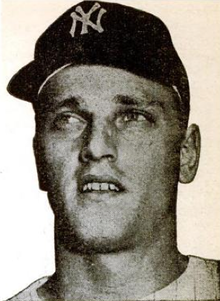 Maris in 1960 | |
| Right fielder | |
| Born:September 10, 1934 Hibbing, Minnesota, U.S. | |
| Died: December 14, 1985 (aged 51) Houston, Texas, U.S. | |
Batted: Left Threw: Right | |
| MLB debut | |
| April 16, 1957, for the Cleveland Indians | |
| Last MLB appearance | |
| September 29, 1968, for the St. Louis Cardinals |
| Years | Games | PA | AB | Runs | Hits | 2B | 3B | HR | RBI | SB | BB | SO | OBP | SLG | BA | Fld% |
| 12 | 1,463 | 5,847 | 5,101 | 826 | 1,325 | 195 | 42 | 275 | 850 | 21 | 652 | 733 | .345 | .476 | .260 | .982 |





